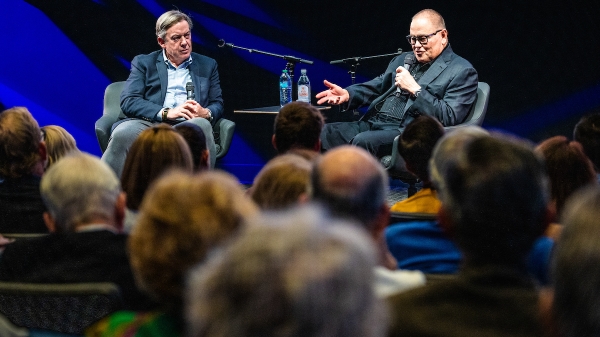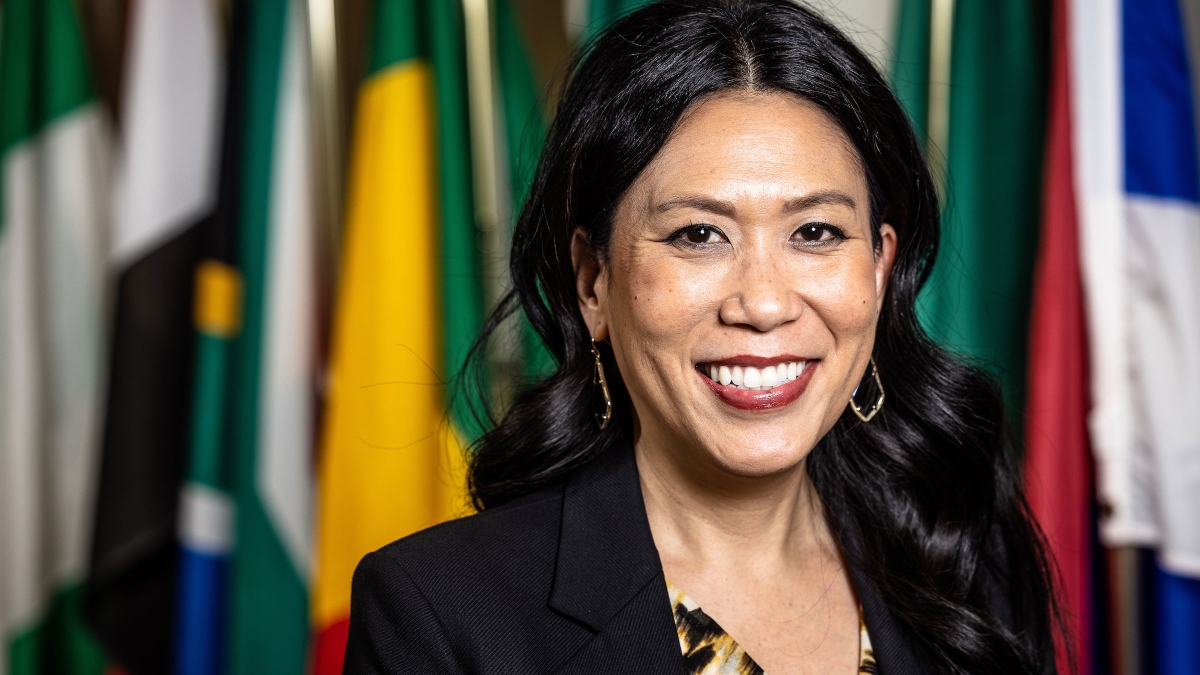Editor's note: New Faces on Campus is a new monthly feature by ASU News showcasing faculty members who have been hired in the 2022–23 academic year.
Valerie Sy isn't afraid to make big and bold life decisions.
At age 40, she left a successful business career to pursue her PhD.
Closer to 50, she transitioned to academia.
One day in the future, she wants to open her own yoga studio. And that’ll probably happen given her track record.
"It is important to look at your life strategically, with a long-term orientation,” said Sy, an assistant professor of global innovation strategy and entrepreneurship at the Thunderbird School of Global Management. “Create goals, review and refresh them often, and don't be afraid to make a major change to get where you want to be.”
Sy is a new face at Arizona State University, and made a major change to be here.
She has several goals while at Thunderbird: conduct research in strategy and entrepreneurship, advance understanding of long-term success and business startups, and be influential in the lives of her students.
ASU News recently spoke to Sy to ask about her life, career and research.
Question: Can you tell us a bit about your background — where you’re from and how you ended up in academia?
Answer: I was born in New Jersey, and as a child, my family moved from New Jersey to Florida, back to New Jersey, then to Texas, where I went to junior high and high school. I attended the University of Texas at Austin for my Bachelor of Science in electrical and computer engineering. Following graduation, I worked for 3M in information technology, and after five years, I returned to the University of Texas at Austin in the evenings for my MBA. I stayed at 3M for 17 years, eventually moving into management in marketing services, sales operations, strategy and business development.
In 2016, I was gifted the opportunity to make a big decision about my career, and I opted to leave 3M and pursue my dream of becoming a university professor. At 40 years old, I studied for the GRE, applied to PhD programs and started my doctorate studies at Texas A&M University in College Station. I graduated in May 2022 with a PhD in strategic management and entrepreneurship, and happily took a position here at Thunderbird School of Global Management at ASU as an assistant professor of global innovation strategy and entrepreneurship.
Q: What is your area of research or academic focus? What are you most excited about regarding your research?
A: I conduct organizational research in strategy and entrepreneurship, specifically in the areas of knowledge, innovation, technology and networks. Having spent my practitioner career in a company that reached its 100-year anniversary during my tenure, I am fascinated that companies and organizations can outlive their human constituents. I believe that founders instill an entrepreneurial spirit into their burgeoning organizations thus enabling and inspiring successive cohorts of managers and employees to continuously innovate and extend the viability of the organization into the unforeseen future. As entrepreneurship becomes increasingly important around the world, I hope to advance our understanding of the internal and external factors that contribute to the success of new startup ventures, as well as extending the longevity of established firms through corporate entrepreneurship.
Q: When did you realize you wanted to study this field? What was your “aha” moment?
A: Since I entered the workforce with a degree in engineering, I mostly viewed the world with a technical lens. When I went back to school for my MBA, I gained an entirely new perspective on how the world works — through business, management, money and profits. I also realized that I loved school, and I vowed to return one day. I continued working at 3M with a refreshed outlook on how technology and business are intertwined. In most roles, I was a boundary spanner who bridged communications between two groups, such as engineers and marketers, software developers and business clients or technologists and managers. After several more years of working in a large company, I decided it was time to build upon my practical skills and return to academia to help organizations and individuals better manage technology and business together.
Q: How do you want to see this field advance to the betterment of society?
A: There has been a lot of conversation recently about artificial intelligence and virtual reality. I want to ensure that our research and teaching recognize the importance of the human element in programming these technological advances — that people are responsible for making ethical choices for the computers right now and into the future. As we continue to create organizations that develop, use and maintain these technologies, we must educate leaders and workers to understand the importance of their roles and make the right decisions to steer artificial and virtual applications toward good, specifically for the overall betterment of our society.
Q: What is something you wish more people realized about what your research?
A: I wish more people realized that management researchers take their jobs very seriously. It takes a lot of effort to ideate, conceptualize, develop, write and publish our research. Scholars are constantly seeking new phenomena to explore, new questions to ask and new angles for evaluating established theories. The academic discourse process, though sometimes very lengthy, is especially valuable for the management discipline because of the importance in society. Without management research, we would not know what comprises an effective organization, its leaders and constituents or its strategic implications.
Q: What brought you to ASU and Thunderbird, and what do you like about the university?
A: I heard about Thunderbird many years ago from a colleague at 3M. When I saw the job posting and read more about the connection with Arizona State University, I was even more interested in exploring this unique learning environment. Combining the diversity and global reach of Thunderbird with the resources and organizational wisdom of ASU is an unparalleled force within higher education. I was especially attracted to the opportunities at Thunderbird to conduct research with some of the greatest scholars in international management, to teach students from all corners of the world and to engage with amazing staff, faculty and alumni all around the globe. All within the ASU enterprise as well, I knew there was the potential to make a big impact here.
Q: What specifically would you like to accomplish while at Thunderbird?
A: I hope to continue to shape global management practice through meaningful research and effective teaching at Thunderbird. For my research, I will broaden the scope of strategic entrepreneurship into more international contexts. For example, what does it mean to be an entrepreneur in different countries, how do multinational companies operate constructively through corporate entrepreneurship, and how can we encourage and promote entrepreneurial activity around the world? For my teaching, I hope to be influential in the careers of future leaders as they take the management lessons learned at Thunderbird forward into their next job, their next new venture or the next company or organization in which they work.
Q: What’s something you do for fun or something only your closest friends know about you?
A: I have been practicing yoga for over 20 years, and I would like to open a yoga studio one day!
Top photo by Charlie Leight/ASU News
More Business and entrepreneurship

Scrappy, adaptive, inventive: A fireside chat with GoDaddy’s Bob Parsons
GoDaddy founder, Vietnam War Marine veteran and New York Times bestselling author Bob Parsons joined Arizona State University President Michael Crow for a fireside chat at ASU’s MIX Center in Mesa on…

Why consumers are flying high this holiday season
A few years ago, the airline industry was in serious trouble.The COVID-19 pandemic crippled travel, and U.S. airlines received $54 billion in taxpayer bailouts, according to the U.S. Department of…

Being kind with in-kind donations
Charities and nonprofits with retail stores must walk a fine line when accepting in-kind donations from the public.If they turn away items they can’t use, they could appear ungrateful. But if they…
